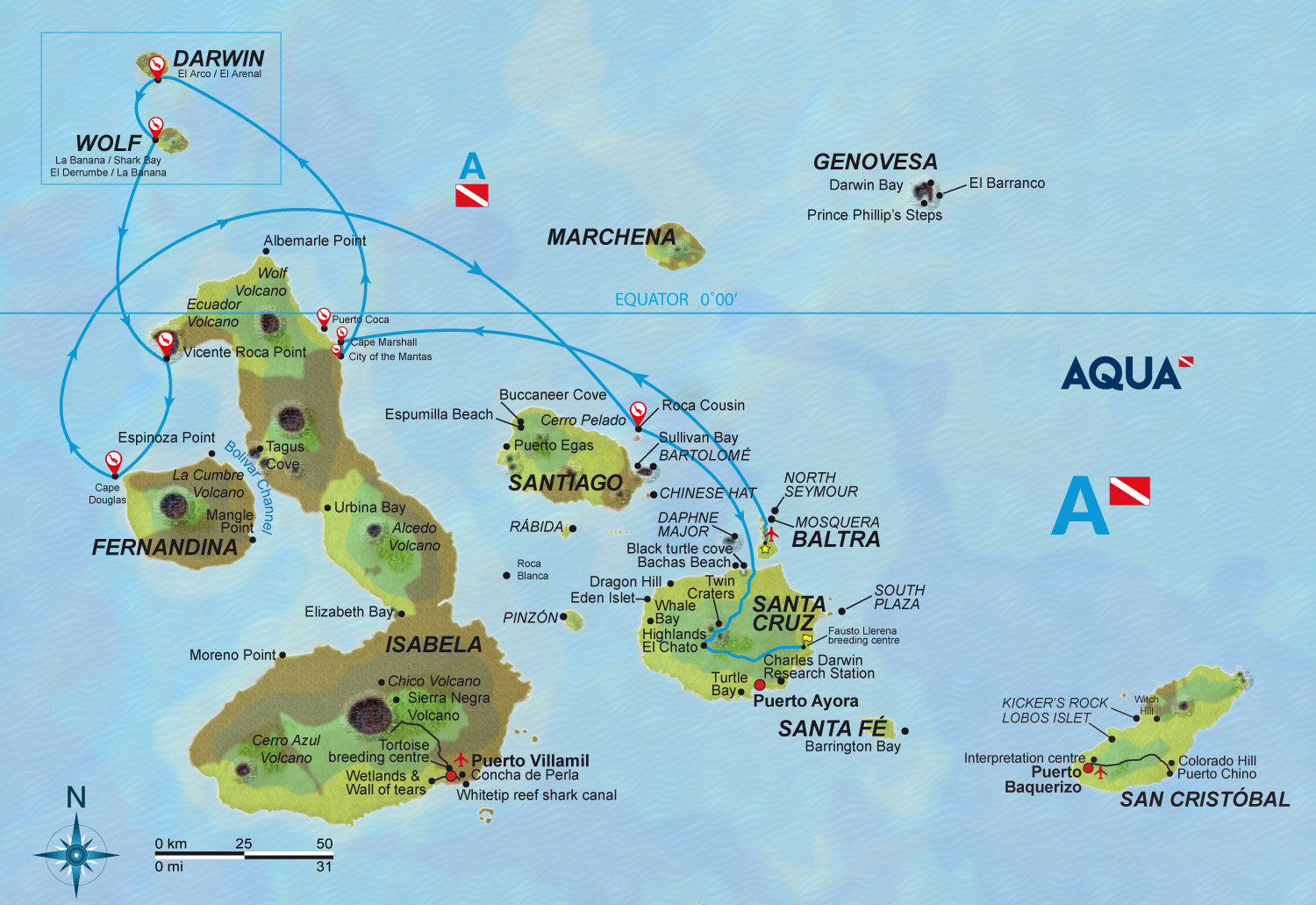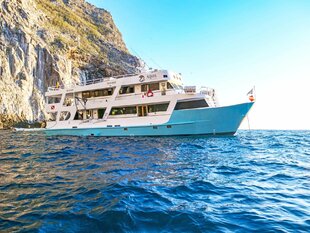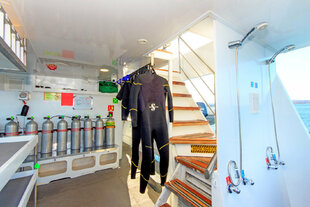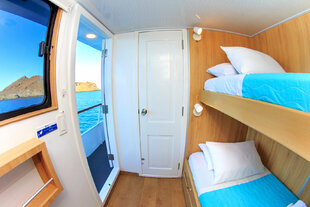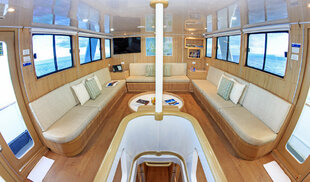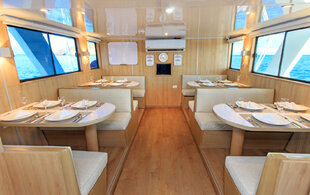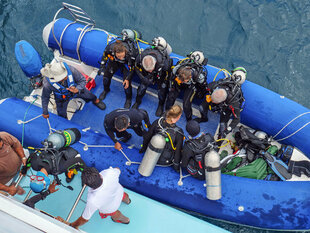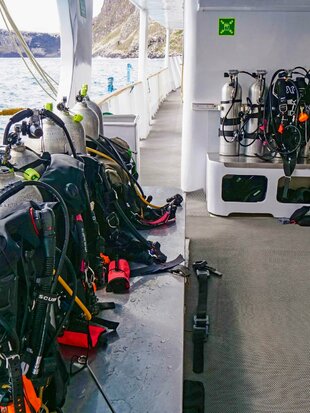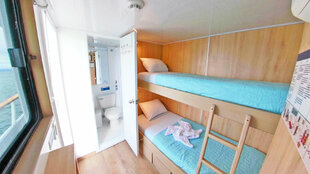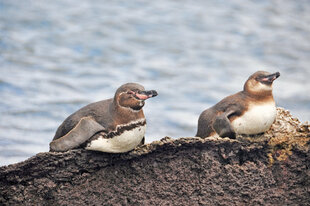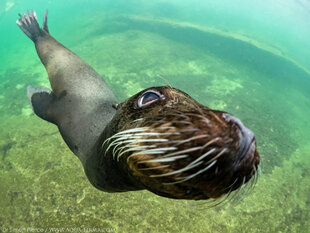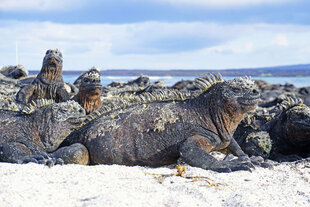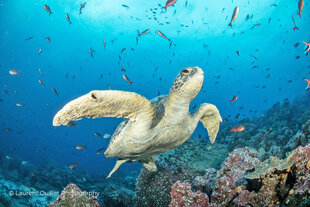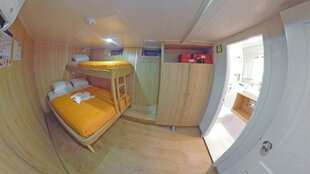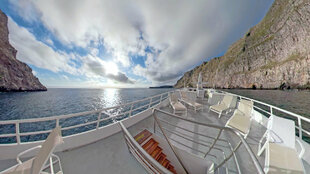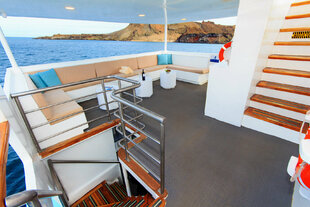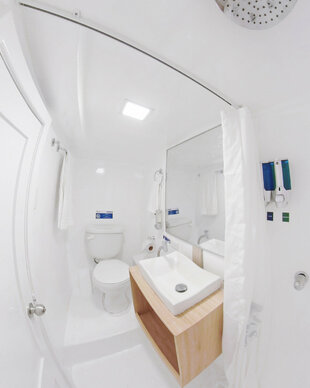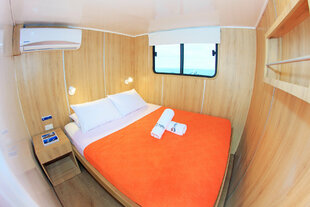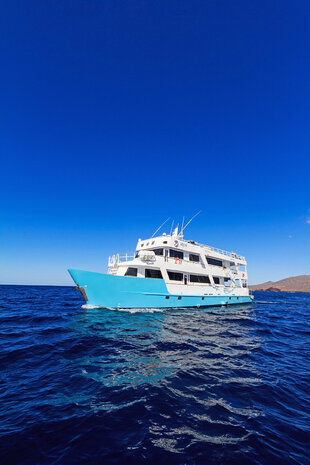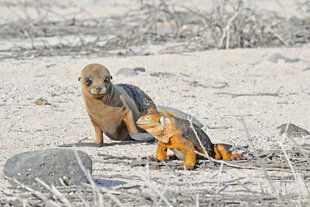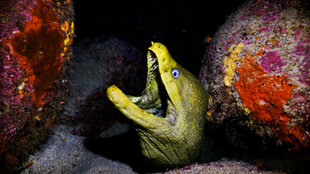Aqua is a dive liveaboard boat with 9 cabins for 16 guests. On the lower deck, there are 2 cabins with double lower and single upper bunk beds and a cabin with single bunk beds. The main deck only features 1 double cabin. The upper deck supports a double cabin and 4 single bunk cabins. Aqua has some relaxation spaces where you can enjoy your journey and its views. These include a lounge and dining area on the main deck, a shaded outside area on the upper deck and a sun deck.
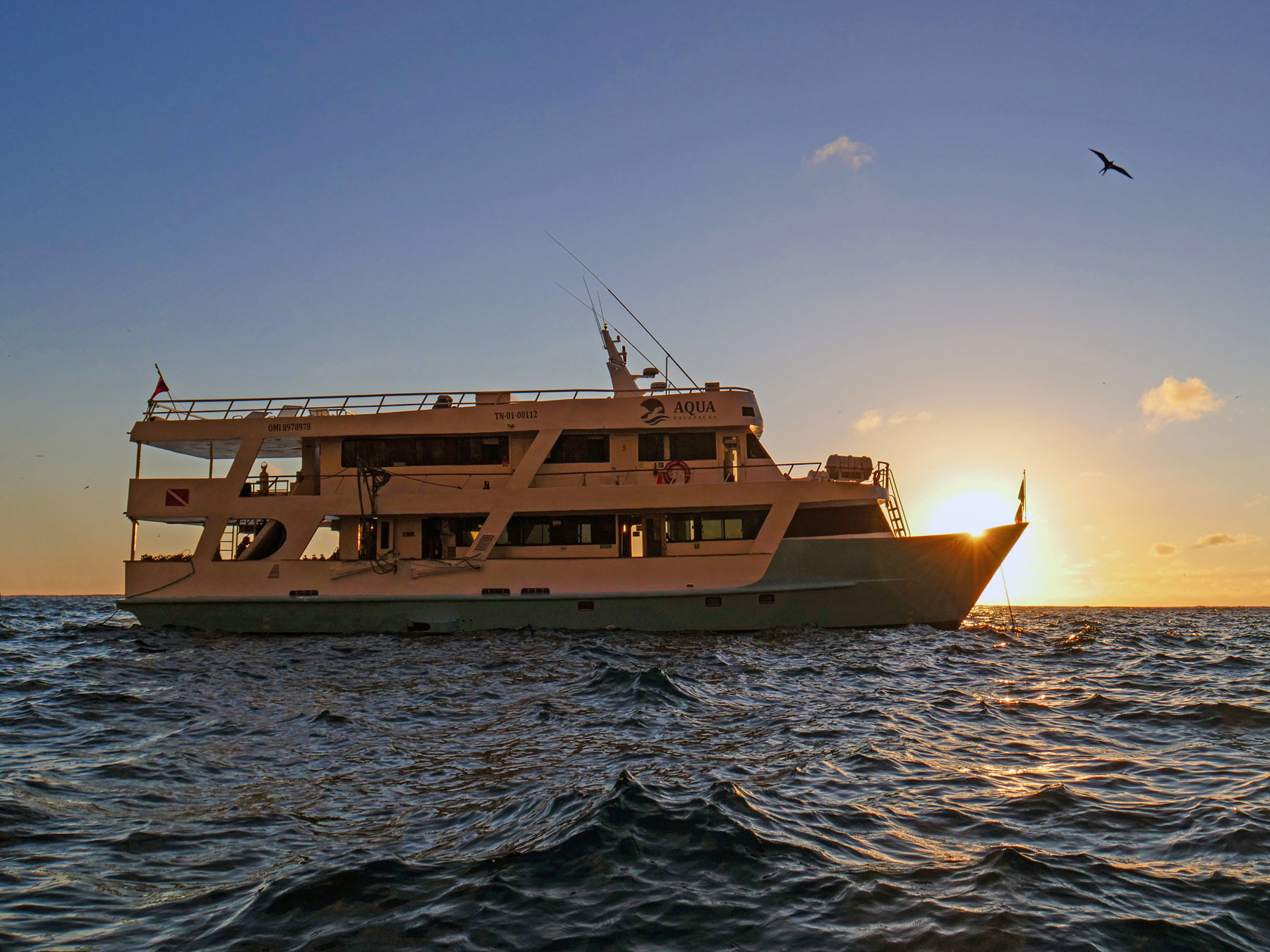
Single bunks can be booked for solo travellers on a room sharing basis, which can be shared with a traveller of the same gender to avoid a single supplement.
There are two routes on Aqua – A & B. Route A is a dive route and route B is a standard non-diving itinerary which is split up into 2 parts: B5 & B4.
Included in the price are all meals, tea & coffee onboard, all activities mentioned in the itinerary and guided by a certified National Park guide & snorkelling equipment (a snorkel, mask & flippers). Wetsuits are available to rent.
Diving, Wildlife & Photography
The primary focus of the trips offered on this boat is diving with marine life in the Galapagos. You will be swimming in the waters of Wolf and Darwin Islands, known for their abundance of sharks like Hammerheads and White-Tips – even Whale Sharks in the right season. It is also common to see Turtles, schools of Tuna, Eagle Rays and Sealions.
There are plenty of opportunities for underwater photographers on these itineraries, not only for marine life already mentioned, but also of complex and unique underwater rock formations. There are great subjects for macro photographers, with opportunities for shots of Sea Horses, Barnacle Blennies and Coral Hawkfish among others.
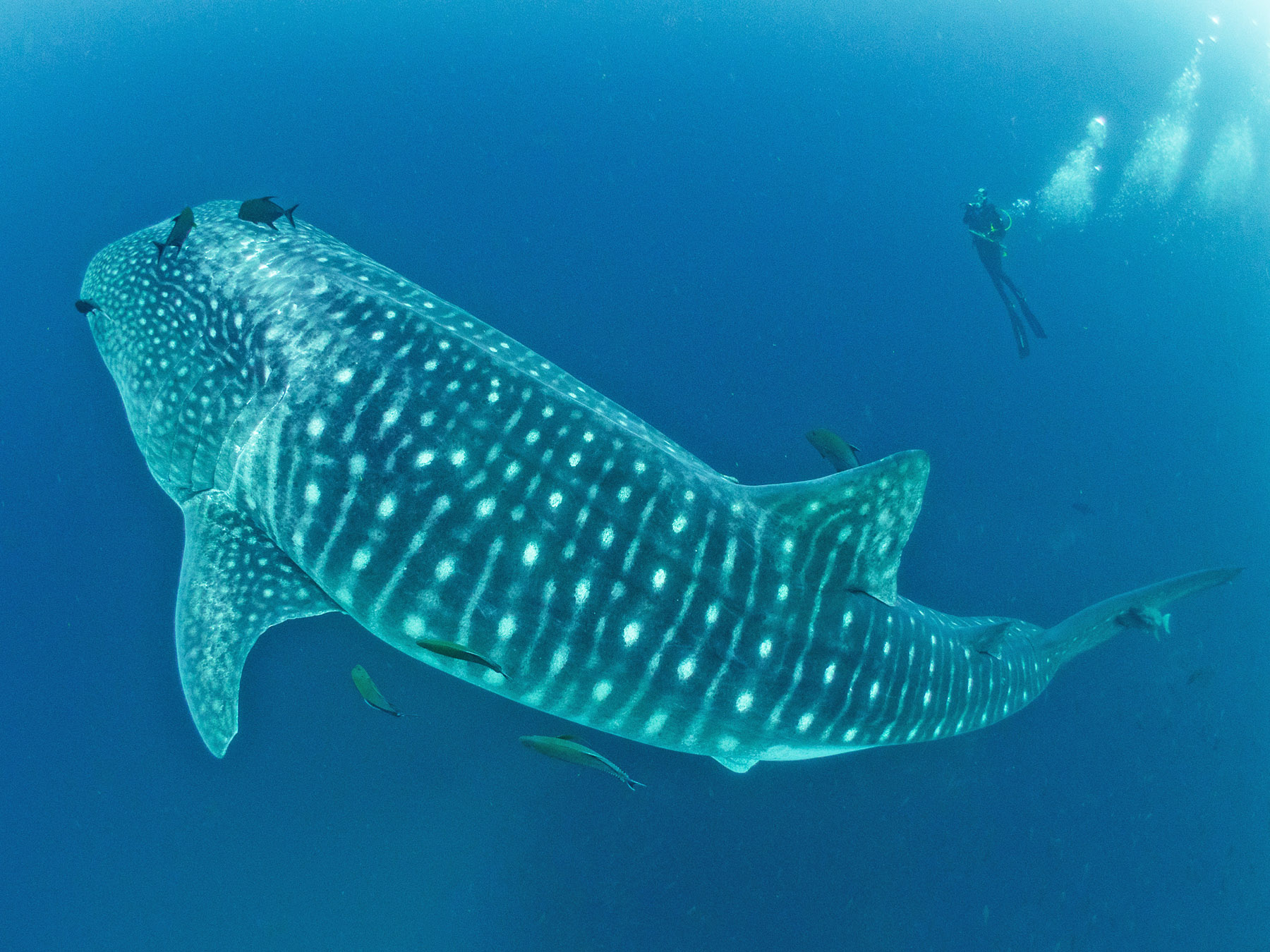
Although the diving in the Galapagos gives a brilliant experience of the archipelago, there are many opportunities to explore more of the islands above the water. This ship does include some activities above water but if you would like to explore more of the Galapagos Islands through land-based excursions, you could consider adding more time to your stay by choosing an add-on experience, such as the ship's naturalist itinerary or one from our Galapagos page.
Technical Specifications
| Length | 25 m / 82 ft |
| Beam | 5.5 m / 18 ft |
| Guest capacity | Maximum 16 |
| Crew | 9 + 1 naturalist guide + 2 dive guides |
| Cabins | 9 (all 10 m2) |
| Construction | Guayaquil 1998 (last refurbished January 2023) |
| Dive equipment | 2x dive tank compressors for enriched air & Nitrox, 12L SCUBA tanks, belts & weights |
| Diving safety equipment | Personal marine rescue GPS, storm whistle, diving beacon, surface marker tube |
| Zodiacs | 2 |
| Social areas | Sun deck, shaded outside deck, lounge & dining room |
| Cruising speed | 10 knots / 18.5 km/h |
| Electricity | 110V |
Deck Plan
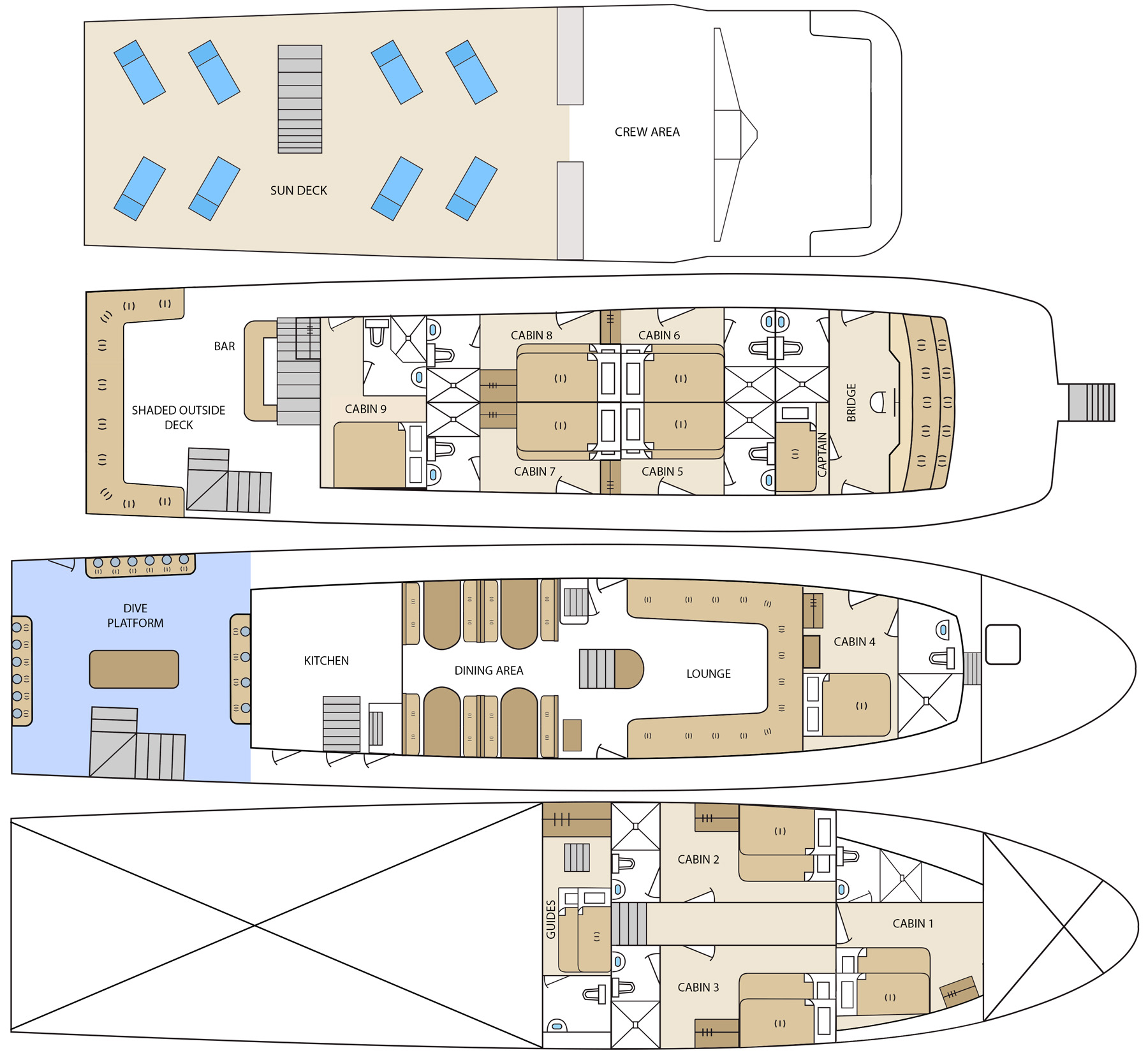
Itinerary
Please note that these itineraries are subject to change without notice due to seasonal changes, last minute weather conditions and the decision of the Galapagos National Park authority.
Day 1 (Tuesday) – Arrival & Checkout Dive
AM: Arrival, Baltra Island
Upon arrival Baltra, travellers pass through an airport inspection point to make sure that no foreign plants or animals are introduced to the islands, and to pay the park entrance fee of $200 (unless it has been prepaid). A guide will meet you, help you collect your luggage and escort you on a short bus ride to the harbour.
PM: Equipment Check Dive, Baltra Island
You will stop in north-east Baltra to try on diving equipment and ensure that it is functional and comfortable.
Day 2 (Wednesday) – Cape Marshall & City of the Mantas
AM: Cape Marshall, Isabela Island
You will spend the morning in Cape Marshall on the north-east side of Isabela at the base of Wolf volcano and will have 2 dives.
In the dive locations here, it is easiest to drift dive across a black coral-coated vertical wall descending to the seabed where Hammerhead, White-Tipped & Galapagos sharks can be spotted. Even Whale Sharks have been seen here. Other marine life includes large schools of Black-Striped Salema and Barracuda.
PM: Ciudad de las Mantas, Isabela Island
Ciudad de las Mantas, so named because Giant Mantas are a common sight here, is a dive site with rich waters, making it easy to spot an abundance of marine life, such as Rays, Sharks, Sea Lions, Turtles & more, which come to feed on plankton here (which can make visibility low).
You will only have 1 dive here this afternoon.
Days 3-5 (Thursday-Saturday) – Darwin & Wolf Diving
You will be visiting Darwin & Wolf Islands. However, due to the large number of good dive sites here, not all will be visited. Your guides will consider marine conditions & how busy each site is before choosing which sites to visit. The possible sites you will visit are described below.
Hopefully, you will be able to have:
- 4 dives at Darwin Island on Thursday
- 2 dives at Darwin and 2 dives at Wolf on Friday
- 3 dives at Wolf on Saturday
Darwin Island
Darwin Island is a high relatively flat-topped island which is impossible to land on since it is sheer cliff all around. Thousands of birds live on the island, including Nazca Boobies and Frigate Birds. In addition to the island, Darwin's Pillars (formerly an arch) is a dramatic feature offshore; and many of your dives will be close to this point. Again, it is impossible to land here safely, but there is a colony of sealions which you will see from a distance living beneath the Arch.
The marine life is usually spectacular here with many sharks, especially hammerheads, which can swim very close. There are also lots of Porites coral bommies, so please avoid touching these. Between June and October / November, you will have good chances of seeing whale sharks here, including some huge females measuring up to about 15 metres.
Below are some of the dive sites around Darwin Island. You may not visit all of these during this experience.
Darwin’s Arch
Darwin’s Arch, now a pillar formation since the arch collapsed in 2021, is one of the Galapagos’ most iconic locations. The shallow reef platforms around the landmark make this a great diving spot for seeing schools of Scalloped Hammerheads. Whale Sharks can also be seen here, mostly between June and November, with females making a stop-off during their solitary migrations.
Darwin’s Theatre
This dive site is where two forked ridges pointing northeast and southeast from the reef foundation of Darwin’s Arch. Curved shelves bending around the northern branch give the appearance of a grandstand with panoramic hangouts at around 18m / 60 ft, giving the dive site its name. There is often swarming marine life here, with Hammerhead, Requiem and Silky Sharks, Yellow-Fin Tuna, Wahoos, Bonitos, Amberjacks and large schools of fish often being common sights here.
El Arenal
This dive site brings you close to the cleaning stations of Darwin Island, where Sharks, Turtles and Jacks regularly visit to be freed from parasites by the resident Barber Fish and King Angelfish. The busiest area here is the sandy slope in front of El Arenal portal. When the surge isn’t too strong, being dropped off here allows you to come face-to-face with Scalloped Hammerheads and resting Pacific Green and Hawksbill Turtles. As you swim further out, you can see the sloping shelves of rubble dropping into a deep gully, with the upper edges offering hideouts for Hammerheads. Other highlights here, depending on the season, include Whale Sharks, Bottlenose Dolphins, Mobula and Devil Rays and Giant Oceanic Mantas.
Shark Bay, Wolf Island
Shark Bay is on the east side of Wolf Island and is shallower than most other sites around it but one of the most memorable due to high Whale Shark traffic which gave the site its name. There are also local cleaning stations here where you can see visiting Hawksbill and Pacific Green Turtles, Spotted Eagle Rays and Hammerhead Sharks.
Wolf Island
Wolf Island is one of our planet’s most incredible dive locations. It is actually made up of two volcanic islands with a sheltered bay which you might share with a Sea Shepherd monitoring boat.
This is a good spot to see Red-Lipped Batfish which 'walk' along the seabed.
Wolf Island itself is one of the best places in the world to dive amongst sharks. This includes schooling hammerheads, Galapagos sharks, silky sharks, white tip sharks amongst the cliffs and caverns and sometimes whale sharks. Spotted eagle rays are another delight here and huge numbers of fish filling the water.
Below are some of the dive sites around Wolf Island. You may not visit all of these on this itinerary.
The Landslide
This is one of the best dive sites of Wolf Island, with hundred of Hammerhead Sharks circling around or heading against the current in some seasons. This drift diving site follows a boulder slope underneath the partly collapsed east cliffs of the islet leading to a hangout between the boulders where you can see Requiem Sharks, pelagic schools. In hotter seasons, Pacific Green Turtles, Spotted Eagle Rays and, sometimes, Mobula Devil Rays and Giant Oceanic Mantas can be seen here too.
The Pinnacle and the Caves
At this site are some of the archipelago’s most interesting caves. Located north of Wolf Island, there are 4 main caves which penetrate the pinnacle, normally easily accessible with cave entrances at 15-21m (50-70ft). A sandy ledge runs along the wall beneath the entrances to each cave, where it is possible to see Hawksbill and Green Turtles gathering, schools of Soldierfish, Guineafowl Puffers, Moray Eels, Whitetop Reef Sharks, Marble Rays, Cardinalfish and Lobsters. If you have time, the cave with the largest opening can be interesting to explore. The dive here ends in the northeast corner of Wolf at a large underwater pinnacle ending just below the water’s surface. If the currents allow, you can hold on to the pinnacle and watch the marine life visible from it.
The Secret Cave (Night Dive)
This dive site was formed by the collapse of large gas chambers dating back to the formation of Wolf. Along the walls which are sometimes surrounded by Hammerheads, there is an entrance to a cave with several nocturnal species like Cardinalfish, Spiny Lobsters, Shrimp, Sea Urchins, hunting Moral Eels, Pacific Green Turtles and Sea Lions.
Anchorage (Night Dive)
Anchorage is the only dive site located on the west coast of Wolf Island. Here, the strange walking Red-Lipped Batfish can be seen 20m (70ft) deep on the seabed. Though this animal is mainly active at night and is attracted by your diving lights, this probably won’t be your only time seeing it.
Day 6 (Sunday) – Vicente Roca Point & Cape Douglas
AM: Punta Vicente Roca, Isabela Island
There are great underwater opportunities at Vicente Roca Point thanks to upwelling cold-water currents here. Marine life in the area includes various shark species, Galapagos Penguins, Seahorses & Mola-Mola. Other animals which you can hope to see here are Nazca & Blue-Footed Boobies, Brown Pelicans & Flightless Cormorants. A Panga ride after your dive will give you the site’s best opportunities for photographing Galapagos Penguins, Flightless Cormorants and Blue Footed Boobies.
PM: Cape Douglas, Fernandina Island
There is some great wildlife to see at Cape Douglas, including Flightless Cormorants, Galapagos Penguins and Marine Iguanas. Beneath the waves you can hope to see Red-Lipped Batfish, Galapagos Bullhead Sharks and Mola-Mola. It is sometimes possible to see baleen whales at this site too. Diving here should be great for Marine Iguana encounters, as well as underwater volcanic formations.
Day 7 (Monday) – Cousin’s Rock & Santa Cruz Highlands
AM: Cousin’s Rock, Santiago Island
This triangular rock formation is home to Blue-Footed Boobies & Brown Pelicans but is also the summit of an underwater cone. There are 2 dive sites at this location – a wall-dive around the steep northeast corner and a ridge flanked by a terraced wall – which will be decided between based on the direction of the currents (normally, you will have 2 dives at one site). Diving here, it is possible to see Galapagos Fur Seals, terraces of colourful algae, White-Spotted Eagle Rays & more.
PM: Highlands, Santa Cruz Island
The road to the highlands leaves from Bellavista, a small village located a 15-minute drive from Santa Cruz’ main town of Puerto Ayora. The road passes through the Galapagos’ most productive agricultural zone, up to the National Park boundary. We find Miconia vegetation at this altitude, changing to the Fern and Sedge zone as we ascend further. With clear weather, we can enjoy beautiful scenes of rolling hills and extinct volcanic cones covered with grass and lush greenery all year round. In the Highlands, you will be able to see Galapagos Giant Tortoises as they graze in freshwater ponds and there will be a diversity of birdlife rarely found in the lowlands. Other species to see at this reserve include Short-Eared Owls, Yellow Warblers & Finches. More elusive species which can be difficult to spot here are Galapagos Rails & Paint-Billed Crakes.
Day 8 (Tuesday) – Departure
AM: Departure, Baltra Island
Your guide & some crew members will go with you to Baltra where you will board the airport shuttle. Your guide will remain with you through the check-in counters & departure hall.
Dates
Diving Itinerary (8 days / 7 nights)
One child discount of 20% of retail rate is applicable for children under 12 years old travelling with 2 full paying passengers but is not applicable on discounted cruises.
Included
Accommodation onboard
All meals, water, coffee & tea
All excursions & diving (on diving itineraries) as mentioned in itinerary (subject to change) with English speaking natural guide
All transfers in Galapagos
Snorkelling gear (mask, flippers & snorkel)
Kayaks
English-speaking dive instructor & divemaster (on diving itineraries)
12L air tanks, weights, belts & SCUBA safety equipment (Personal Marine rescue GPS, storm whistle, diving beacon & surface marker tube) (on diving itineraries)
Towels (on diving itineraries)
Excluded
Round-trip flights to Galapagos
Galapagos National Park entrance fee ($200)
Transit Control Card ($20)
Airport transfers in Galapagos
Soft & alcoholic drinks
Tips & gratuities
Travel insurance
Full dive equipment rental (BCD, regulator, mask, fins, 7mm wetsuits, hoods, gloves, boots, dive computer & torch are available for $250 for all 8 days) (on diving itineraries)
Nitrox ($150 pp) (on dive itineraries)
Nitrox course ($250 pp) (on dive itineraries)
Single Supplements
There is a 50% supplement for up to 2 single cabin bookings per departure. Additional single cabins can be booked with a 100% supplement.

